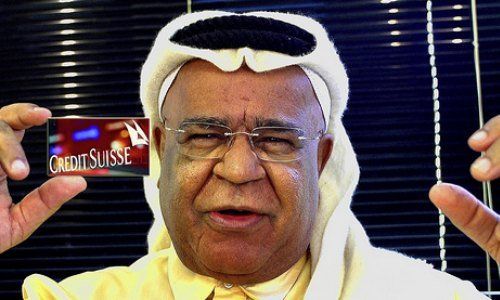Qatar has been boycotted by an Arab quartet for months, and this is now strating to have a direct impact on Credit Suisse, which has close relations with the Emirate: the Swiss bank is now also being boycotted.
Since June Qatar has been struggling under a boycott imposed by Saudi Arabia, Egypt, the United Arab Emirates (UAE) and Bahrain, for allegedly funding terrorism. This boycott has now been extended, according to the «Financial Times» (firewalled article) . This is now also affecting Swiss banking giant Credit Suisse (CS).
The UAE and its capital Abu Dhabi are now systematically excluding western banks in which Qatar is a large shareholder, from business. This became apparent when the Abu Dhabi National Oil Company Investment Bank invited banks to a listing of one of its subsidiaries.
Informal Boykott
Credit Suisse was invited, but dropped out of the pitching process very quickly, a banker told the «Financial Times». A similar thing happened when the oil concern invited investment banks to an auction for a $5 billion bond issue.
The boycott of banks, which in addition to CS include Deutsche Bank and Barclays, are informal but these banks have been informed by officials in Abu Dhabi that they won't be granted any significant future mandates. The reason being the relatively large shareholdings by Qatar's sovereign wealth fund, and members of the country's ruling family.
Earlier Threats
Qatar has been a major shareholder in Credit Suisse since 2008. At the time Qatar Holdings owns 5.01 percent of CS shares as well as purchase rights, in the form of convertible bonds, for a further 13 percent.
CS pays high interest rates of 9 and 9.5 percent, which generates hundreds of million of dollars for Qatar. Qatar's representative Jassim Bin Hamad J.J. Al Thani recently left CS's administrative board.
Qatar, which sits on huge gas reserves, has been embargoed by the Arab quartet since June, and representative of the four have also already threaten sanctions against companies doing business with Qatar.
Nasty Behaviour
Officially no actions have been taken as this could cause a diplomatic fallout with western countries. «We've been told this is an informal boycott. We can do nothing about it», a banker said. Abu Dhabis' behaviour is nasty. Neither CS nor Deutsche Bank and Barclay would comment on Abu Dhabi's actions.
These development are less than favourable for CS. The banks close ties to Qatar involve a joint venture called Aventicum Capital Management in Doha which offers investments in the Middle East and Turkey.
What Goes On in Saudi Arabia?
Abu Dhabi is an investment hub in the Middle East, and financial institutes earned around $237 million in the UAE in 2016. The Swiss bank also has ambitious plans for the region, and is investing more than $600 million to build a market presence in Saudi Arabia, where it is also awaiting a banking licence.
Attrative Market for Investment Banks and Wealth Managers
The Middle East and Gulf States are regarded as bullish, attractive markets as they look to decouple their economies from their reliance on the fossils fuels. They are also looking to diversify and reorganize state enterprises, partly through listings.
These activities will attract and free up huge capital flows, which offers enormous potential to investment banks and wealth managers.
The biggest single such transaction is expected in Saudi Arabia with the partial listing of the state oil company Saudi Aramco. Among the consulting banks are J. P. Morgan, Morgan Stanley and HSBC. Up to now there have been no signs of a similar informal boycott of banks with Qatari shareholders by Saudi Arabia, bankers say.



































